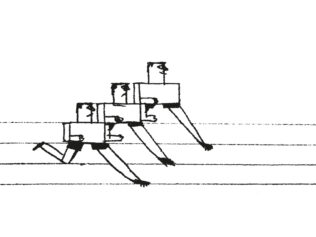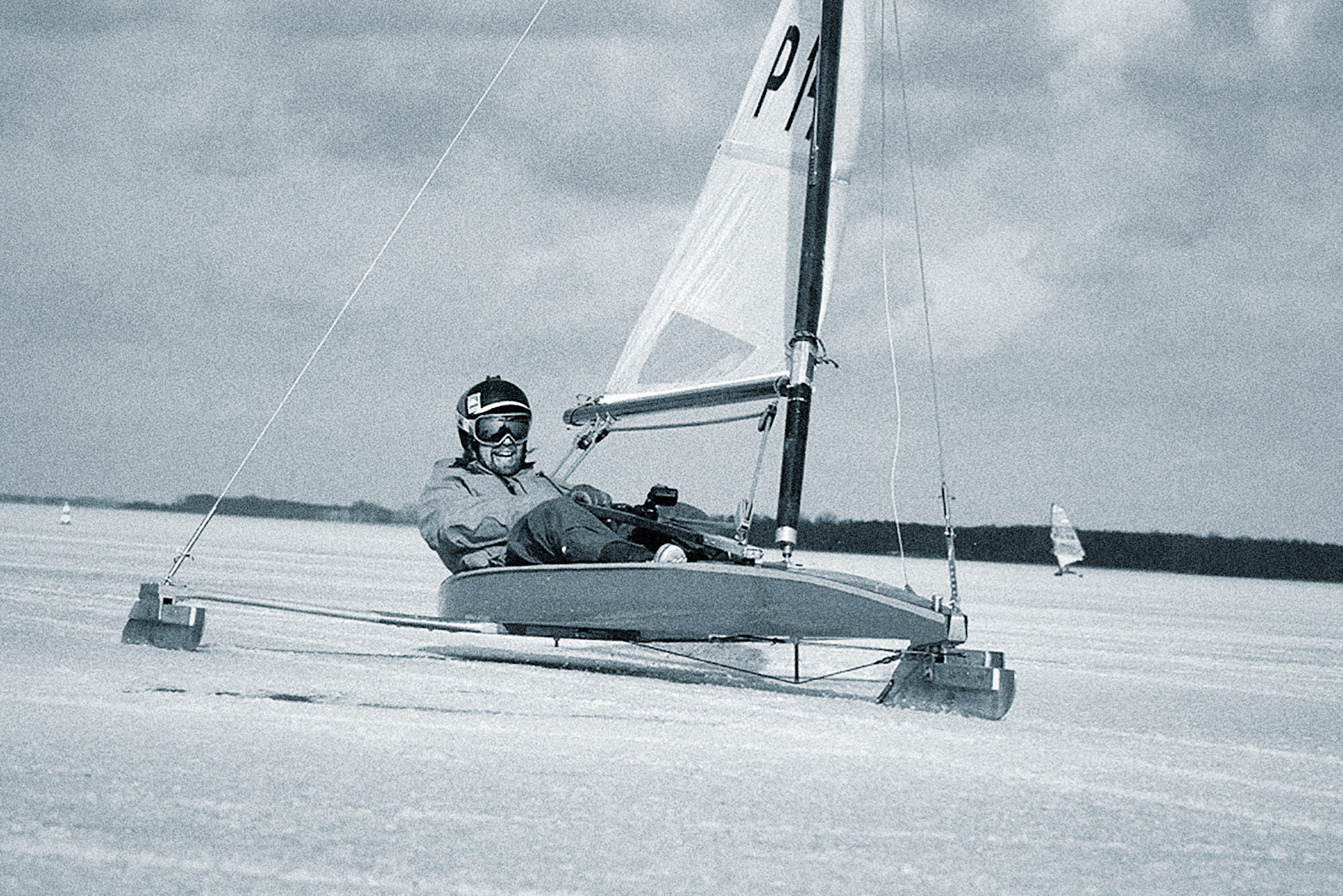
He was a fan of the legendary hockey player Wayne Gretzky and train robber Ronnie Biggs. When he grew up, he started playing hockey himself—and also robbing banks. By the late 1990s, he became the most wanted criminal in Europe. For six years, he led the Budapest police around by the nose, earning the status of national hero. They called him the Whiskey Robber.
Between 1993 and 1999, there was a spate of twenty-nine armed robberies in Budapest. The targets were usually smaller post offices or bank branches, and the crimes were attributed to a single perpetrator, whom the press dubbed the Whiskey Robber. For six years, they couldn’t catch the bandit, and successive heists made him a media star. Seeing the country’s enormous corruption and political scandal, the citizens rejoiced that finally somebody was stealing like a simple brigand, and not a white collar politician.
The most humiliating job for the Budapest police robbery division was the thirteenth holdup. In March 1996, after draining two glasses of Johnnie Walker on the rocks in a nearby bar, the bandit entered a small post office on Kemenes Street with a gun in his hand, and said loudly—“I’m sorry, but this is a robbery.” According to witnesses, the Whiskey Robber was dressed to look like Lajos Varjú, the head of the division, who was working on this case. An identical striped suit, the same mustache and hat.
During the holdup, one of the employees managed to press a silent alarm connected directly to the police, but the duty officer shrugged off the alert. Several minutes later, the whole division was running to the scene. They were in such a hurry that two of their cars collided with each other. When they finally arrived, the only trace of the robber was the faint smell of whiskey and empty cash drawers. There was also a camera crew from TV2, who recorded the arrival of Inspector Varjú, describing the whole affair, somewhat in the spirit of Monty Python: “And at last, the police have finally arrived.”
Escape From Transylvania
Attila Ambrus—that’s the thief’s true name—was born in Transylvania, which Hungary had lost to Romania. The region is inhabited by the Székelys, a Hungarian ethnic group, whose ancestors most certainly include a certain Hun by the name of Attila. This fourth-century conqueror was the namesake of the child who twenty-six years later would become the most wanted man in Hungary.
The boy had a tough life—his mother abandoned the family when he was eighteen months old, and his dad was an alcoholic, who beat him often. Eventually, Ambrus ended up with his aunt and uncle, who tried to care for him and sent him to school, but he didn’t achieve much success. He dreamt of a better life, but was gradually becoming known for having sticky fingers. When he and his friends decided to start a band, they simply stole the instruments from another group. The case soon came to light, and Ambrus ended up in a juvenile correctional facility for the first time.
Under the rule of Romanian president Nicolae Ceaușescu, ethnic minorities had almost no rights, so the situation in the lands populated by the Székelys was hopeless, and everybody dreamt of escaping to Hungary. In trouble with the police, and having no prospects to speak of, a young Ambrus decided to cross the border illegally and seek his fortune in Budapest. He arrived at a train station near the border and hid under one of the cars. Risking a fall on the tracks, he made it through, and two hours later arrived in the capital of Hungary. He didn’t have a penny to his name, and his clothes were covered in grease and oil.
I’m a Hungarian
“I’m a Hungarian and I want to stay in Hungary, in Budapest,” Ambrus announced in the immigration office. He got a residence permit on the spot; finding work was tougher. Nevertheless, he quickly learned how to survive in the city, and where to get free meals. He tried his hand as an electrician, a baker, and even a gravedigger. Finally, determined to change his life, he called the office of the Újpesti TE ice hockey club, thirteen-time national champions.
The sport could have been a chance for the young Ambrus. As a twelve-year-old, he had qualified for his city club’s junior team, and turned out to be so fast and strong that he could compete with older players right away. His hopes for a sports career, however, were doomed by Ambrus and his friends’ musical ambitions. He hadn’t been on the ice for ten years, but this time, in a new environment, he decided to do everything he could to get back into the game. Players from Transylvania have a great reputation and are real fighters, and that’s exactly how Ambrus introduced himself when he talked to the club representative—who, thinking he was speaking with a professional hockey player, invited him for a tryout right away.
A few days later, a new goaltender arrived on the UTE rink, to square off against several players from the core team. Unfortunately, even his entry onto the rink showed that something was off, and when Ambrus made it to the goal, he was completely lost. After a few straight shots, the pucks started bouncing off the goalie’s mask and helmet—the players had set up a shooting gallery.
After the tryout, it was clear that Ambrus had no chance of becoming a goaltender, but instead he started working as team janitor. He also had a small room to live in, and that was all he needed. He did minor repair jobs and cleaned, but in the end he did make it onto the ice—as a Zamboni operator. Soon, he’d become so close with the team and the coach that he could take part in practices, and with time became the team’s unofficial third goalie—in other words, he never played, and didn’t get a player’s salary, but was on the roster.
“This is a Robbery!”
The times of political and economic transformation in the early 1990s were just as difficult for Hungary as for other countries in the crumbling Eastern Bloc. Sudden, unrestrained privatization allowed a select few to get rich, while the rest had to fend for themselves. It was no different with athletes, who once had state salaries, and now couldn’t survive on their club paychecks. Almost all of the UTE’s players had to hustle on the side. One had a video rental store; another worked at a used car dealership; and although nobody said it out loud, the two brothers, forwards, most likely provided cars to that dealer, right off the street, without papers.
Using his contacts in Romania, Ambrus began smuggling furs to Austria. The business was picking up, and he felt increasingly confident. He found a girlfriend and bought a car. Life was beautiful—until the moment the customs staff at the border changed, and smuggling became impossible.
The path from fur smuggler to bank robber may seem long, but Ambrus, seeking to improve his material status, quickly came up with the idea of knocking over a post office. His childhood idol, Ronnie Biggs, was a member of the gang that pulled off the heist of the century—the Great Train Robbery, which in 1963 netted the equivalent of $54.3 million today. Biggs escaped custody, and used some of his share of the loot to undergo plastic surgery. With a new identity, he ended up first in Australia, and then Brazil, where he lived the life of a celebrity without fear of extradition. A book he wrote became young Ambrus’s favorite read.
Ambrus chose a small post office as his first job—he knew it had no alarms or armed security. He dressed in an out-of-style suit, a wig, and oversized shoes—in case the police looked for the suspect based on footprints. However, before the robbery, he had to stop in at the bar next door and have a drink of whiskey. For courage; to loosen up. Soon thereafter, he appeared at the door of the post office. An employee was just locking up. Ambrus acted instinctively, pushing the woman inside and pulling out a dummy gun. “This is a robbery,” he said, and the women froze in fear. Fortunately, the cash drawers were open. Ambrus started to shove the money into a bag, and after precisely three minutes ran out, without looking back. After a moment, one of the employees leaned out of the post office, shouting “Robber! Robber! Catch him!” Ambrus started to run even faster and almost tripped over his oversized shoes. However, owing to his hockey stamina, he easily got to a safe distance, where he could check his haul. It turned out he had “earned” 548,000 forints—about $5,600. A huge sum in Hungary in those days. He was so thrilled, he threw up.
Easy Come, Easy Go
The stolen money went fast. Ambrus spent it on women, cars, suits, and travel, which became his favorite activity. The young man who had never been on an airplane indulged in discovering exotic destinations: Indonesia, Madagascar, the Canary Islands—several times a year, always bringing his partners and friends. Interestingly, several travel agencies whose services he had used also fell victim to his robberies. Ambrus also had a weakness for casinos. On a typical night, he’d blow through sums that were astronomical for a mere mortal. He quickly earned the status of a playboy, telling his teammates that he was still making money on fur smuggling, or that he was being supported by rich women. His spending was on the rise, but money was never a problem—when it ran out, he planned and executed another heist.
In choosing robbery sites, he followed the rules he’d learned from Biggs’s book. He measured the distance from the nearest police station, carefully planned out at least two escape routes, and observed the building and the people who worked there. He approached the task so seriously that at a certain point he started keeping a notebook, where he wrote down the details of potential targets. For each job, he prepared wigs and disguises, sometimes painting on facial hair. Plus, he always stopped by a bar for a whiskey on the rocks.
The Whiskey Robber’s growing popularity in the media and the investigators’ tightening noose caused Ambrus to become paranoid, and lose control of his life. He spent more time in casinos, so he continuously needed more money. In 1997, the Whiskey Robber struck as many as seven times, but during the heists was becoming less careful, more aggressive, and drank not one or two glasses to loosen up, but a whole bottle.
Heist in the Morning, Hockey at Night
Despite his criminal activities, Ambrus never gave up playing hockey. Though the Újpesti TE, once a powerhouse of the Hungarian league, was past its prime, playing on a first-league team fulfilled Ambrus’s childhood dreams. His coaches and teammates from 1994 to 1998 remember him as a titan of work, who never missed a single practice. After one of the robberies, he went straight to the rink, skating as if nothing happened. That same evening, he also showed up at a league game, sitting on the bench in his goalie mask for the entire match. The afternoon newspapers had published a composite photo of the robber, and Ambrus feared he’d be recognized.
The Whiskey Robber didn’t play very often—despite his dedication and exceptional fitness, he was simply a weak goalie, but over time, he became more experienced. There was even a moment when the club, due to financial problems, couldn’t hire another goaltender and promoted Ambrus to be the starter. Fans of the Budapest team remember this period as the worst in the club’s history—in one game, Ambrus managed to give up twenty-nine goals; another time he let in eighty-eighty over six matches. Remarkably, Ambrus’ name never appeared on the players’ payroll, though he was considered the wealthiest player in the league.
The Fortune Teller’s Words
The effectiveness and audacity of the Whiskey Robber, who could hit the same post office as many as four times, laid bare the helplessness of Hungary’s law enforcement, for whom armed robberies were something completely foreign. The Budapest police created a special unit to handle the case. It was led by Lajos Varjú, who despite his sincere intentions and great dedication, simply had no relevant experience, and even admitted that he learned detective work from the series Columbo. The investigative team that arrived at the scene of the crime had neither the tools nor the skills to preserve evidence, or even collect fingerprints.
The Whiskey Robber remained elusive, and the press, time and again, criticized the cops, who couldn’t get a hold of the case. At a certain point, the detectives turned for clues to a fortune teller in the hope that she and her crystal ball could predict the location of the next score—the only way was to catch him red-handed.
The Last Match
Gábor “Gabi” Orbán was the son of the UTE coach, and also a younger teammate of Ambrus. Fascinated by the older player’s lifestyle, he tried at all costs to find out what the goalie really did for a living. Preparing for the next jobs, which were to bring a bigger haul, Ambrus knew he’d need a partner. After a few weeks of investigating the potential candidate, he decided to reveal that he was the Whiskey Robber. Orbán didn’t hesitate for a moment, and agreed to everything.
After twelve more-or-less successful stunts together, in March 1998, disguised in suits and wigs bought for the occasion, they attacked a small bank branch. Orbán stood guard—his job also included disabling the cameras and keeping track of the time, while Ambrus threatened the staff with a pistol and demanded that they open their cash drawers. Clearly fuddled by alcohol, he took too long to pack up the money, giving the cops enough time to arrive. The robbers fled; chased by the police, they made it to the bank of the Danube River. Ambrus leapt into the water and got away, but Orbán was caught.
That same evening at the hockey match, it turned out that two players from the home team were absent, of whom one had been detained by cops in connection with the Whiskey Robber case. The assembled UTE fans quickly realized that the famous bandit had to be none other than their team’s goalie, and they chanted his name until the end of the match.
In the meantime, Ambrus managed to swim across the river and make it home, grabbing cash, his car, and his beloved dog. He lit out for the Romanian border, hoping he’d arrive there before the chase. This time the police were up to the task, and the Whiskey Robber was finally arrested.
Media Stardom
Due to thorough reporting, the Whiskey Robber has become a semi-legendary figure in Hungarian media, often compared to Sándor Rózsa—the 19th-century outlaw who robbed the rich (the Habsburgs) and gave to the poor. Though Ambrus never gave any money to anyone, according to many Hungarians he stole money from rich banks that were preying on the poor. The popularity of the bandit who sipped whiskey before a heist, and brought flowers to the women in the banks he robbed, had at one point been so great that a record-breaking Hungarian crime TV show asked him to commit his robberies on Mondays or Tuesdays, so that journalists could be ready for their Thursday broadcasts.
Countless marriage proposals started to flood into the detention facility where he was incarcerated. There were also plenty of people wanting to adopt his dog. Politicians and celebrities vouched for Ambrus, and he himself, tired of the criminal life, cooperated with the prosecutors, describing his accomplishments in detail. But his celebrity status didn’t lessen the weight of the crimes he committed—for armed robbery, Ambrus could be sentenced to as many as ten years in prison, and realistically he could face a much longer sentence. After lengthy negotiations, he agreed to sign a confession and accept the court’s verdict, on one condition—that he not be charged with attempted murder. Ambrus refused the accusation that during one of the robberies, he shot at a police officer. He maintained that he fired into the air.
On July 10, 1999, taking advantage of the guards’ inattention, Ambrus escaped from the detention center on Gyorskocsi Street. He lowered himself from the third floor of the building using sheets and extension cords tied to a rope, which turned out to be too short. An hour later, he landed on the pavement, twisting both his ankles. All of Budapest was shut down. The city was patrolled by helicopters and thousands of cops, and the renowned Hungarian lawyer who chose to represent Ambrus for free announced: “The Whiskey Robber is not a murderer, and will never let himself be caught.”
The goalie’s popularity was greater than ever before. During a police press conference, the chief was asked whether he knew that public opinion polls showed a clear majority of Hungarians didn’t want the Whiskey Robber to be caught. The officer replied that when more than ten million citizens support the bandit, rather than the police, it shows the condition of the country.
The Trial
Being at large was worse for Ambrus than being locked up. Some believed he’d fled to Romania, but actually, he stayed in Budapest, hiding in rented apartments. He lived like a ghost, walking on tiptoes and leaving the lights off. Trusted people brought him food, and he never left his hideout. After a few weeks of silence, in desperation he decided to pull another job—he dreamt of getting together enough money to pay for plastic surgery and escape to Brazil, just like Ronnie Biggs had done. In these circumstances, he had little to lose.
Robbery No. 28, however, turned out to be a complete failure. Ambrus was so drunk that the bank employees laughed at what he said. Upset, he took only the money from one till—almost 230,000 forints ($900)—and escaped by a true miracle. The police had to put up with another wave of mockery from the press, and the street vendors started selling T-shirts that read: “Go Whiskey Robber!”
From his hideout, Ambrus prepared the next job—this time, with as much precision as he did at the start of his career. Three weeks after the last flop, he entered an OTP Bank branch on Üllői Street, taking a record haul of 51 million forints (around $200,000). He managed to escape, but the cops found a phone at the scene that led them to Ambrus’s hideout—and this really was the end of the Whiskey Robber’s criminal career.
The trial went on for ten months and it turned into a huge spectacle, covered by the media worldwide. The story of the hockey goalie who robbed twenty-nine banks, escaped from jail and is considered a national hero—a script for Hollywood. In fact, Ambrus’s lawyer took advantage of this idea and without his client’s consent, sold the rights to the story.
The Whiskey Robber was sentenced to fifteen years in prison. Delivering a speech in the courtroom, he apologized for his actions, but he couldn’t keep from commenting on the politicians and businessmen who steal billions of forints with impunity. Ambrus served his sentence in the Sátoraljaújhely prison, on the border with Slovakia and Ukraine; as he himself said, “at the end of the earth, where even the birds don’t fly.”
Epilogue
Today, Attila Ambrus runs a pottery workshop in central Budapest, and remains in public life. He was released from prison in 2012, after almost eleven years. The sentence was cut short for good behavior, after Ambrus spent most of it reading and working out. He made up for the shortcomings in his education, and even earned a Master of Fine Arts degree.
His story inspired a few books and an action film. To the repeated question “Was it worth it?” he always answers, “In fact, prison was my salvation. I was rolling downhill through alcohol, money, adrenaline, and numbness. What I did was bad and selfish. I committed many crimes and made mistakes; I can’t change that now. I’ve done my time, and I have no intention of returning to the past. Now I want to do everything I can to return to society, and just concentrate on living.”
Translated from the Polish by Nathaniel Espino
This translation was re-edited for context and accuracy on January 20, 2023.










